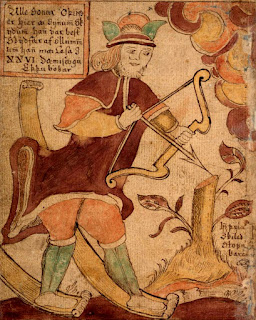I’ve been racking my brain about what to write this week. So, naturally, the idea comes to me while I’m feeding my goats and other sundry critters. Heathens do a lot of offerings and blots, but are they the right ones? And can we scientifically talk about “offerings” in the context of a more enlightened age? Actually, I think we can, and I know I’m going to ruffle a few feathers with this, so hang on.
Let’s Talk About Wights
One of the critters we give offerings to are the wights. Wikipedia states:
Wight is an English word, from Old English wiht, and used to describe a creature or living sentient being. It is akin to Old High German wiht, meaning a creature or thing.
Now, granted, the concept of Wights in our beliefs tend to touch on those magical spirits that inhabit homes, land, and other places. Technically, our gods could be considered wights, as well as humans, as the Anglo-Saxon term actually suggested a human being.
I’m rather agnostic when it comes to wights, although I seem to have had what could be construed as possible encounters with them. But for the sake of argument, I’ll talk wights like I believe in them.
Your Car Wight
 Okay, with me so far? So, let’s say the wights are the essence of some sort of “thing,” whether it is a tree, stone, a piece of land, or whatever is around us. We can consider animals as part of the “wights,” in my not so humble opinion, and we may be able to consider everyday objects as wights as well.
Okay, with me so far? So, let’s say the wights are the essence of some sort of “thing,” whether it is a tree, stone, a piece of land, or whatever is around us. We can consider animals as part of the “wights,” in my not so humble opinion, and we may be able to consider everyday objects as wights as well.
“Wait a second,” you say. “There aren’t wights when it comes to computers, dishes, or cars.” Oh, I would heartily disagree. If you’ve ever worked on cars, airplanes, computers, or some other mechanical device, or operated them for any length of time, you damn well know each of them have their own distinct personality. You can drive five of the very same model and same year of vehicle and get a different impression of each. Even from the factory.
Now, you may argue that cars obtain their “personality” from the persons who assembled it on a particular day, the flaws in the parts they might have, and the owners they have. Okay, so how is this different from something living? We obtain our basic genetic code and personality from our parents (Mom had something to do with our assembly), the flaws we have (you have arthritis or maybe a healed broken bone?), and the experience and care we receive growing up. Hmmm. That sounds like there are correlations here.

“But my car isn’t sentient!” you say. “It’s a man made construct!” I’d agree with you, only to a point. Everything we see and use has been created from the same natural materials that came from stars. The metal that makes up the car was mined. The fuel it uses is from plants and animals that rotted millions of years ago. Everything in a car — every molecule — came from nature. We did not create the mass, although we can rearrange molecules and change them into different compounds. So, if you subscribe to wights at all, you have to consider your car is a wight.
Does My Car Need Offerings?
This is a silly question, but one that you’ll have to look at seriously. We certainly do make “blots” to our cars. We even have some very prescribed rituals for making sure they are satisfied and will give us a gift in return for our gifts.
Our frequent blots to our cars: we go to the gas station for fuel. We offer our hard-earned tokens that symbolize our energy equation (money) in exchange for other energy (fuel), and we have a special requirement for how to provide the offering (open the fuel cap, prepay at the pump, insert the nozzle, etc.) Less frequent blots: changing the oil, rotating the tires, getting a tune up, etc. Often, these blots occur at a particular seasonal time: change summer tires to winter tires in the fall, change winter tires to summer tires in the spring, tune up the car late spring for summer trips, etc.
We offer these “gifts” in exchange for our car’s gift: transportation. Still don’t believe the car is a wight? People talk to them all the time. They name their cars. They grow attachments to them. Some people trust their cars better than they trust their spouses. I remember back in college friends comparing the top end speed of their Volkswagen Beetles. Same era and virtually the same cars, yet they were very different.
Now, did these wights talk back or go rescue your ass when you got stuck with a bad date? Of course not. That’s not within their operating parameters. But they have quirks and behaviors you can’t ignore (especially when they hate cold weather).
Let’s Take This One Step Further
So, if you’re with me that cars and computers and airplanes can be wights, then it’s not a farfetched conclusion to look at what we give them in return for gifts. We give them something they need in order to perform properly. When I look at my goats, I know I need to feed them hay and minerals plus give them water, and assuming the goat kidded, I will get milk in return. Gift for a gift. Now, let’s look at our nature wights and our gods. This now brings me to the question: if we give offerings, what are we giving the gods and nature Wights that they need?
In other words:
What the fuck does a god or land wight need with mead?
See my problem? We could make up some woo-woo stuff about the essence strengthening the land wight or the god appreciating the sacrifice. But I’m not sure that really works. In fact, I would argue that it may not do anything for the land wight. And a god? If a god is the essence of what he or she represents, I’m wondering if sacrificing things that have no bearing on what the god is would even be appreciated.
Now I may be full of shit here. But I notice that more often than not the gods favor those in particular areas who have made a fair amount of effort toward whatever they look to gain. Sure, there is blind, dumb luck like those who win who play the lottery, but with the exception of maybe the Lokeans, most of us don’t depend on randomness in our lives.
So What Would Be an Appropriate Offering to the Gods and
Wights? (Or would Thor like a Tesla Coil?)
If we take the gods as personified metaphors, then we need to look at their function and see what strengthens their role. Wisdom and creativity are two things that Odin would like. Tyr is obviously the god of laws, so doing something toward upholding law and order is appropriate. But then I start getting silly and seeing within my mind’s eye Thor’s glee at a Tesla coil. Yes, somehow, I think he likes those.
When it comes to wights, the offering should be appropriate to the wight. If we can, we need to understand what makes that wight and that particular environment thrive. That might mean clearing out noxious weeds on a piece of land, or maybe providing water during a drought, but in all honesty, I believe that if there are wights, wights are limited by the physical constructs they cling to. That means that they can only do what is prescribed by their form. A tree wight, for example, can only do things that trees do — in the relation of gifts and giving. It can accept things that the tree can use, and it can provide what the tree can provide. Anything else is asking something beyond it’s reasoning. It’s like asking a dog to explain particle physics to you. Assuming the dog knows particle physics (which, with the exception of a couple I know, don’t), the dog can’t tell us that he knows because he can’t speak our language due to lack of a soft palate, shape of the tongue, and possibly the inability to understand English. (Although most dogs I know have a limited human vocabulary.) So, I suspect is the problem with asking the wrong thing from the wights.
So, Where am I Going with this?
So, am I telling you to stop laying out offerings? No. Am I telling you that my way is the only way? No. Am I thinking that we’re doing blots wrong? Maybe. We got the concept of offerings from our ancestors, who may or may not have had an understanding of what the gods and wights wanted/needed. After all, while there are many good things we learned from our ancestors, our ancestors got shit wrong all the time, especially when it came to science. So they could’ve just anthropomorphized the gods and wights and assumed they wanted things that people want. But do the gods have needs that we as mortals can satisfy?
And then the question remains is, are they at all interested in what we give them? I mean, Odin doesn’t need Twinkies. (Neither do I, but no one sends a package my direction, either.) It may simply be the act of giving the gods something we value that works, and not necessarily the item. I can accept that. But I do ponder the implications of today’s musings and wonder if we’re going down the wrong path with our blots.
Then again, the whole idea is the goats’ fault, since I was feeding them. You can blame them.
—
If you enjoyed this post, consider becoming a patron of The Rational Heathen. For about the cost of a Starbucks’ coffee a month, you can get information not on the blog as well as early releases of the post such as this one. There are other levels of support as well, so feel free to check it out. What’s more, you only pay for the posts you get. So, if I don’t produce anything, you don’t owe anything. It’s a great way to encourage me to write, and to produce really cool things. Join up at Patreon and become The Rational Heathen’s patron!


 While I don’t believe that our relationship with our gods is quite as extreme as ants to humans, you can see the point. With the exception of Yahweh, most gods go about doing their godly things with as much consideration to us as we do with ants. If the gods take any notice in what we’re doing, it’s because we’re doing something to get their attention. But trivial stuff? They probably don’t even bother.
While I don’t believe that our relationship with our gods is quite as extreme as ants to humans, you can see the point. With the exception of Yahweh, most gods go about doing their godly things with as much consideration to us as we do with ants. If the gods take any notice in what we’re doing, it’s because we’re doing something to get their attention. But trivial stuff? They probably don’t even bother. I’m reminded of the Greek story about Zeus and Semele, the mother of Dionysus. Zeus loved Semele so much that he promised her anything swearing by the River Styx. Hera, Zeus’s wife, who is insanely jealous, told Semele to ask to see Zeus in all his glory as a god. This, of course, would kill her. But he made an oath he couldn’t back out of, and so she died. But Zeus rescued his son, Dionysus, whom Semele was pregnant with, and sewn him into his thigh to finish gestating.
I’m reminded of the Greek story about Zeus and Semele, the mother of Dionysus. Zeus loved Semele so much that he promised her anything swearing by the River Styx. Hera, Zeus’s wife, who is insanely jealous, told Semele to ask to see Zeus in all his glory as a god. This, of course, would kill her. But he made an oath he couldn’t back out of, and so she died. But Zeus rescued his son, Dionysus, whom Semele was pregnant with, and sewn him into his thigh to finish gestating.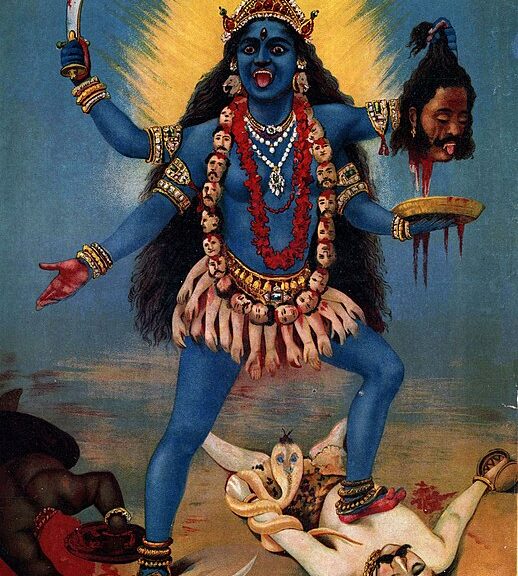
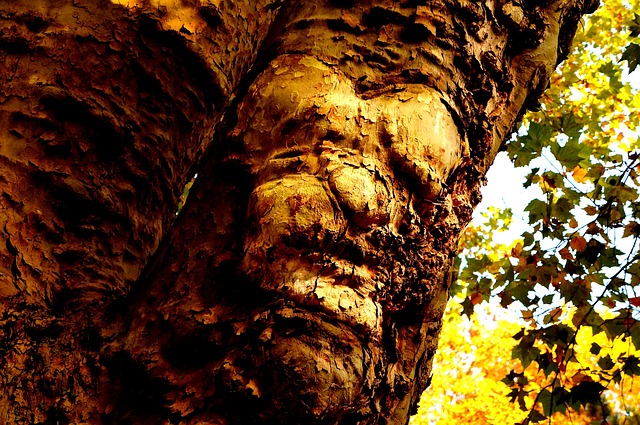

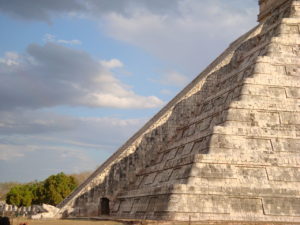

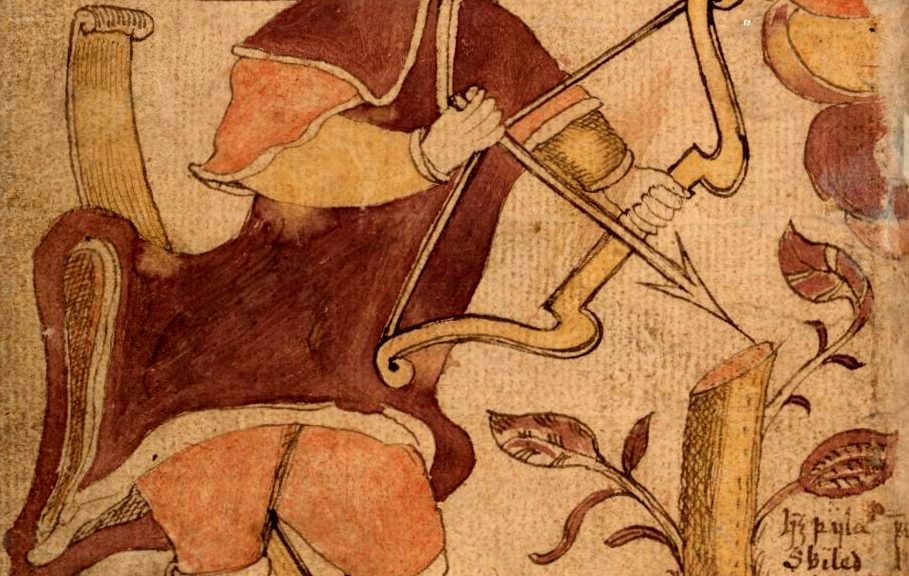
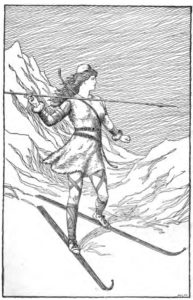 We know more about Skadi than Ullr, so I’ll talk about her first. Skadi is a Frost Giant (or Jotun) turned goddess and is the daughter of Þjazi. Skadi has a single story (although she and Loki argue in Lokasenna) on how she sought justice for the death of her father, Þjazi. Þjazi was the Jotun who tricked Loki into stealing Idunn and her Golden Apples from the gods.
We know more about Skadi than Ullr, so I’ll talk about her first. Skadi is a Frost Giant (or Jotun) turned goddess and is the daughter of Þjazi. Skadi has a single story (although she and Loki argue in Lokasenna) on how she sought justice for the death of her father, Þjazi. Þjazi was the Jotun who tricked Loki into stealing Idunn and her Golden Apples from the gods.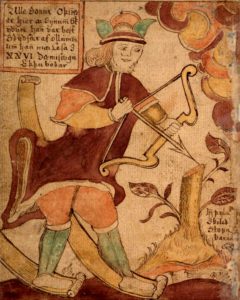 Now we come to Ullr, and by the gods, there isn’t a lot written up about him. Which is a shame, because Ullr was an important god in the Northern countries. Ullr is the god of wintertime sports and hunting. He is also the god of oaths; our ancestors swore on Ullr’s oath ring. Ullr was called on in duels, presumably to oversee the contest or to grant favor. He was also the head of Asgard when Odin was in exile for ten years.
Now we come to Ullr, and by the gods, there isn’t a lot written up about him. Which is a shame, because Ullr was an important god in the Northern countries. Ullr is the god of wintertime sports and hunting. He is also the god of oaths; our ancestors swore on Ullr’s oath ring. Ullr was called on in duels, presumably to oversee the contest or to grant favor. He was also the head of Asgard when Odin was in exile for ten years. Before I go further with this, I want to caveat this by saying these are my experiences with these gods, and like anything, Your Mileage May Vary. I’ve had plenty of dealings with Skadi, but not Ullr. Back when I competed in a certain winter sport, Skadi and I held an uneasy truce. I was a lot more wary of her then, and while I know she is a very dangerous goddess, over the years I’ve come to understand her. She doesn’t suffer fools in her territory, so every time I am out in the backcountry, I am aware she could take me out.
Before I go further with this, I want to caveat this by saying these are my experiences with these gods, and like anything, Your Mileage May Vary. I’ve had plenty of dealings with Skadi, but not Ullr. Back when I competed in a certain winter sport, Skadi and I held an uneasy truce. I was a lot more wary of her then, and while I know she is a very dangerous goddess, over the years I’ve come to understand her. She doesn’t suffer fools in her territory, so every time I am out in the backcountry, I am aware she could take me out.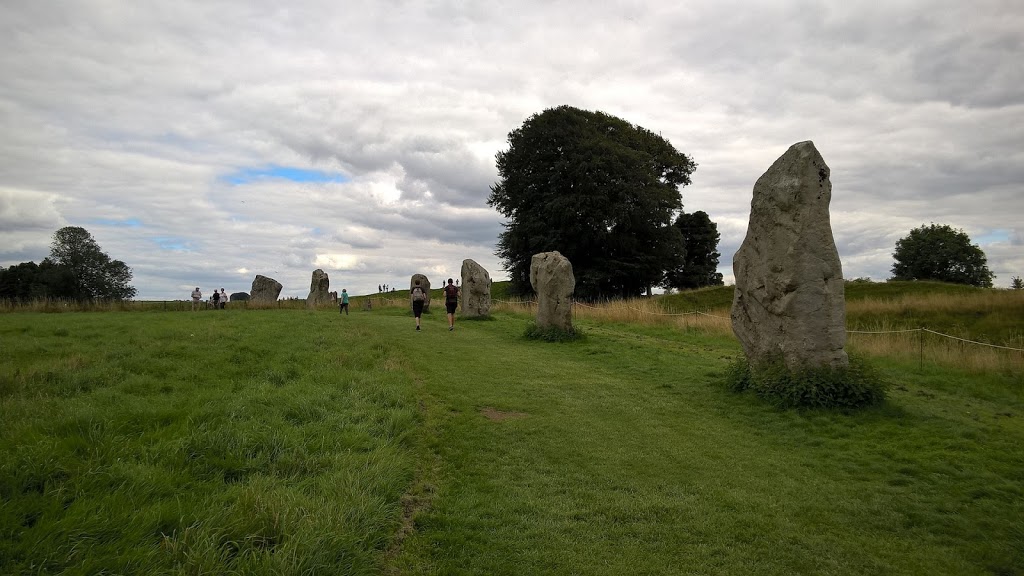
 Before I get into the supposition that the gods are with us, let me address the personal nature of the gods, themselves. There are Heathens who believe that our gods really aren’t personal deities. That the concept of a personal deity comes from Christianity and those concepts taint our modern day beliefs.
Before I get into the supposition that the gods are with us, let me address the personal nature of the gods, themselves. There are Heathens who believe that our gods really aren’t personal deities. That the concept of a personal deity comes from Christianity and those concepts taint our modern day beliefs. 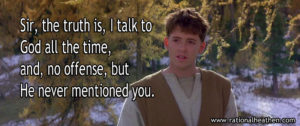 These aforementioned gods that have very little to do with humanity are not the gods I am talking about. The gods I am talking about are the gods who have made themselves known to humans. Who still make themselves known to humans. Odin, Thor, Freyja, Freyr, Tyr, Loki, Baldr, Skadi, Ullr, Heimdallr,…the list goes on. We would not know them if we did not have contact with them. Sure, you could say that hearing thunder and calling it a god is the basis for Thor, but then, why bother to have positive connotations with a thunder god if he didn’t somehow look benevolently on humans?
These aforementioned gods that have very little to do with humanity are not the gods I am talking about. The gods I am talking about are the gods who have made themselves known to humans. Who still make themselves known to humans. Odin, Thor, Freyja, Freyr, Tyr, Loki, Baldr, Skadi, Ullr, Heimdallr,…the list goes on. We would not know them if we did not have contact with them. Sure, you could say that hearing thunder and calling it a god is the basis for Thor, but then, why bother to have positive connotations with a thunder god if he didn’t somehow look benevolently on humans? are reserved and only show up at times they deem is suitable. They seldom come when you call –remember, they’re not your bitches. Even if you ask nicely, you can get complete crickets. They may have more important things to pay attention to. Like the entire universe.
are reserved and only show up at times they deem is suitable. They seldom come when you call –remember, they’re not your bitches. Even if you ask nicely, you can get complete crickets. They may have more important things to pay attention to. Like the entire universe. benevolent intentions, you should definitely get a name or an understanding of who or what they are. They shouldn’t be passing themselves off as a god. If they are, I wouldn’t want to deal with them simply because of the dishonesty.
benevolent intentions, you should definitely get a name or an understanding of who or what they are. They shouldn’t be passing themselves off as a god. If they are, I wouldn’t want to deal with them simply because of the dishonesty.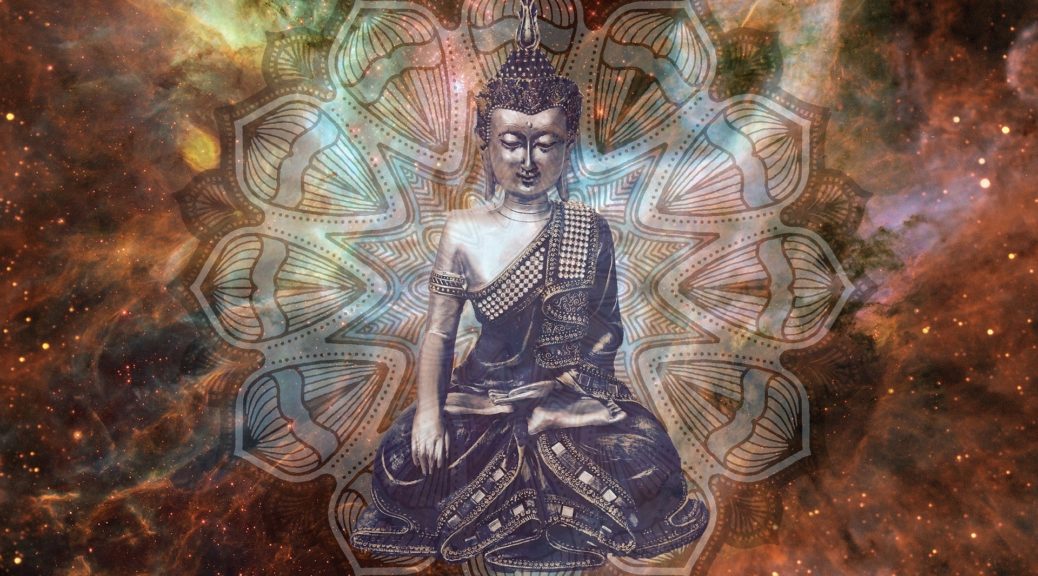
 You’ve been in a religion for some time. Or perhaps you’ve not been in a religion at all. Maybe it is Christianity; maybe it is another pagan religion. Perhaps you’ve been agnostic or even atheist. Or maybe you’re a Heathen like I am. Regardless, now you’re looking at a calling and…it’s not a god or goddess you follow. What do you do?
You’ve been in a religion for some time. Or perhaps you’ve not been in a religion at all. Maybe it is Christianity; maybe it is another pagan religion. Perhaps you’ve been agnostic or even atheist. Or maybe you’re a Heathen like I am. Regardless, now you’re looking at a calling and…it’s not a god or goddess you follow. What do you do? If you’re a Christian or someone who have been in the Abrahamic religions, this is often a complete shock. Same goes for atheists, who are more likely to think they’ve gone crazy hearing from a god or goddess. Depending on your religious upbringing, you may think the deity is some form of demon coming to tempt you away from the “One True God.” If you fall for the Yahweh argument, you’ll never get anywhere with this. Instead, you’ll turn down a potential positive and more personal relationship with the gods than you ever had with the god of the monotheistic cults.
If you’re a Christian or someone who have been in the Abrahamic religions, this is often a complete shock. Same goes for atheists, who are more likely to think they’ve gone crazy hearing from a god or goddess. Depending on your religious upbringing, you may think the deity is some form of demon coming to tempt you away from the “One True God.” If you fall for the Yahweh argument, you’ll never get anywhere with this. Instead, you’ll turn down a potential positive and more personal relationship with the gods than you ever had with the god of the monotheistic cults.
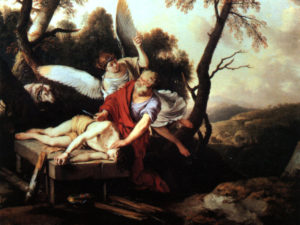 You’ve gotten a call from a deity. Before you get all starry-eyed, think about what you’re committing yourself to. Is this god or goddess asking you to do something against your morals or against the law? Are they looking at having you harm someone or yourself? If the answer is yes, then say no and walk away. Take the high road here. Don’t be like Abraham who was asked to sacrifice his only son as a burnt offering because apparently Yahweh gets his rocks off watching humans squirm, even though he is supposedly omniscient and omnipotent. What was the purpose of THAT mindfuck? Tell me that. Don’t say to prove loyalty, because an omniscient and omnipotent god would already know the outcome.
You’ve gotten a call from a deity. Before you get all starry-eyed, think about what you’re committing yourself to. Is this god or goddess asking you to do something against your morals or against the law? Are they looking at having you harm someone or yourself? If the answer is yes, then say no and walk away. Take the high road here. Don’t be like Abraham who was asked to sacrifice his only son as a burnt offering because apparently Yahweh gets his rocks off watching humans squirm, even though he is supposedly omniscient and omnipotent. What was the purpose of THAT mindfuck? Tell me that. Don’t say to prove loyalty, because an omniscient and omnipotent god would already know the outcome. the Hel out of them and get a good feeling for who they are. Talk to priests or priestesses of that religion and get their take on your contact. Be aware that you may not have been contacted by a god, but by an ancestor, a wight, or some other denizen looking to make contact. When you do finally establish contact, find out what they want. If what they want isn’t against your moral code or the law, then you have to decide if you want them in your life. (If it is against your moral code or the law, run like Hel.) Above all, keep your head when this all occurs. You may have to step gracefully out of the relationship. Lastly, even if the god or goddess isn’t from your pantheon, you should still accept the contact if it is a favorable one. After all, the deity thought enough about you to visit.
the Hel out of them and get a good feeling for who they are. Talk to priests or priestesses of that religion and get their take on your contact. Be aware that you may not have been contacted by a god, but by an ancestor, a wight, or some other denizen looking to make contact. When you do finally establish contact, find out what they want. If what they want isn’t against your moral code or the law, then you have to decide if you want them in your life. (If it is against your moral code or the law, run like Hel.) Above all, keep your head when this all occurs. You may have to step gracefully out of the relationship. Lastly, even if the god or goddess isn’t from your pantheon, you should still accept the contact if it is a favorable one. After all, the deity thought enough about you to visit.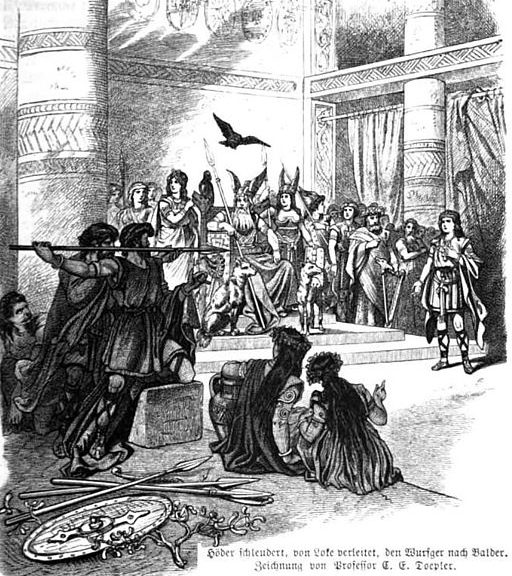
 One of the most iconic stories in Norse mythology is the death of Baldr. It is probably the best known among Heathens and often recited by the anti-Lokeans as a way to justify why the Rokkatru are wrong to even consider venerating Loki and his ilk. While I’m not Rokkatru (although I suppose someone can point to me being a follower of Skadi as being a Rokkatru), I do have a deeper analysis of why the story of Baldr’s death is more than face value.
One of the most iconic stories in Norse mythology is the death of Baldr. It is probably the best known among Heathens and often recited by the anti-Lokeans as a way to justify why the Rokkatru are wrong to even consider venerating Loki and his ilk. While I’m not Rokkatru (although I suppose someone can point to me being a follower of Skadi as being a Rokkatru), I do have a deeper analysis of why the story of Baldr’s death is more than face value.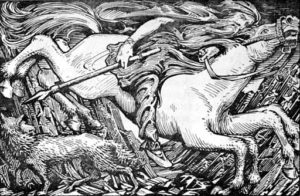 Baldr had nightmares of his death. Odin therefore went to Niflheim to consult a dead seeress to find out what was the cause of Baldr’s nightmares. The seeress told Odin that that Baldr would die by Hodr’s hand (Hodr is the brother of Baldr).
Baldr had nightmares of his death. Odin therefore went to Niflheim to consult a dead seeress to find out what was the cause of Baldr’s nightmares. The seeress told Odin that that Baldr would die by Hodr’s hand (Hodr is the brother of Baldr).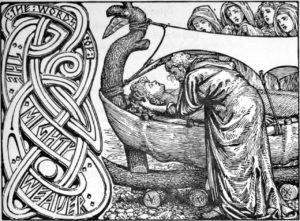 was not throwing things. Loki offered to guide Hodr’s hand so he could throw something. He put the mistletoe into Hodr’s hand. Hodr threw and the dart pierced Baldr’s heart. Baldr fell dead.
was not throwing things. Loki offered to guide Hodr’s hand so he could throw something. He put the mistletoe into Hodr’s hand. Hodr threw and the dart pierced Baldr’s heart. Baldr fell dead.
 It’s little wonder why the mistletoe is a symbol of the winter solstice, since it is the symbol of Baldr’s death. But the winter solstice is also the symbol of the return of life. We know that the days will grow longer again after December 21st, just as we know the days will start to grow shorter after June 21st. So, this summer solstice, raise a horn or glass of mead to the god of rebirth and renewal. Because we know that Baldr may “die” with the oncoming winter, but he will be reborn once again. (And the Christians thought that they were the only ones with a god who dies and is reborn?)
It’s little wonder why the mistletoe is a symbol of the winter solstice, since it is the symbol of Baldr’s death. But the winter solstice is also the symbol of the return of life. We know that the days will grow longer again after December 21st, just as we know the days will start to grow shorter after June 21st. So, this summer solstice, raise a horn or glass of mead to the god of rebirth and renewal. Because we know that Baldr may “die” with the oncoming winter, but he will be reborn once again. (And the Christians thought that they were the only ones with a god who dies and is reborn?)

